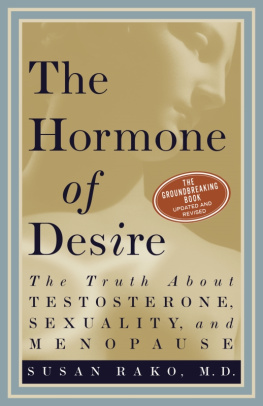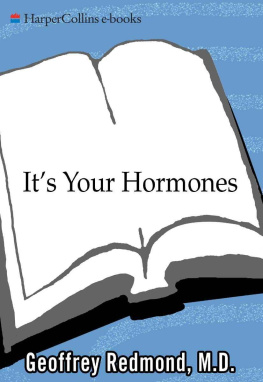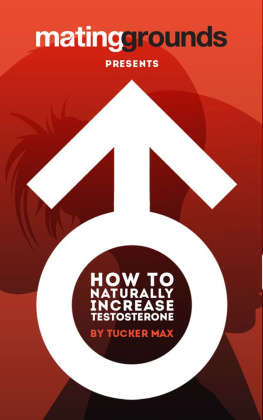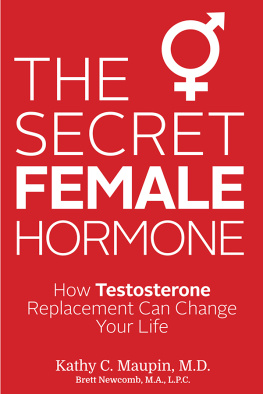Copyright 1996 by Susan Rako, M.D.
All rights reserved. No part of this book may be reproduced or transmitted in any form or by any means, electronic or mechanical, including photocopying, recording, or by any information storage and retrieval system, without permission in writing from the publisher.
The information in this
book is educational in
nature and is not intended
to substitute for or to
supersede individual
responsible medical
consultation.
I dedicate this book to my daughter,
Jennifer Sarah Rako,
whose love and particular qualities of character and beauty reflect, inspire, and support my best efforts.
And to her daughter, Alexandra Grace
Indeed, Medicine claims always to make experience the test of its procedures. Plato therefore was right in saying that to become a true doctor, a man must have experienced all the illnesses he means to cure and all the accidents and circumstances on which he is to give an opinionTruly I would trust such a man. For the others guide us like the man who paints seas, reefs and harbors while seated at his table and sails the model of a ship there in all safety. Toss him into reality and he does not know where to begin.
Montaigne, Essays, bk.I [1580], ch. 13,
Of Experience
Acknowledgments
I can testify to this truth:
The moment one definitely commits oneself, then Providence moves too. All sorts of things occur to help that would never otherwise have occurred.
William Huchison Murray
My gratitude for the providential assistance, generosity of spirit, patience, and wisdom of Ruth Hapgood, Sandra Goroff-Mailly, Jennifer Rako, Ed Klaiber, and Jeanne Mayell.
Catalytic contributors to this effort include Ted Kaptchuk, Deborah Rose, Daniel Federman, Helen Singer Kaplan, and Barbara Sherwin.
I wish to thank the women who offered the use of details of their lives and excerpts of their written communications as clinical examples and with generous intention that their experiences might be of help to others.
I appreciate my dad, Robert Mandell, for his unconditional love, prayers, and zest for life.
And I thank my Editor at Crown/RandomHouse, Shaye Areheart, for her belief in this book and for her respect for the integrity of my writing.
Contents
Index
Introduction
Today, women of all ages have come to appreciate their potential for a fulfilling and enduring sexual life. Dr. Susan Rako has researched and written a landmark book. With the publication of The Hormone of Desire, we finally have detailed, complete, responsible information about testosterone deficiency and supplementation. Addressed to women and to their doctors, this book redefines the concept of hormone replacement therapy to include testosterone for the large population of women who need it for the maintenance of vital and sexual energy whether their testosterone deficiency has been caused by natural aging and menopause, surgical removal of the ovaries, or the effects of chemotherapy.
To understand why this is such an important book, it is worth remembering that not long ago, womens sexuality was a subject cloaked in mystery, about which little scientific information was known. Sexual responsivity was thought to be a one-step process, beginning with lust and ending with orgasm. In keeping with this point of view, there was only one female sexual disorder frigidity.
In their best-selling book, Human Sexual Inadequacy, published in 1970, Masters and Johnson described in meticulous detail the physiology of the sexual response cycle and popularized the concept that orgasm, in both sexes, is triggered by the same physiological mechanism. The New Sex Therapy (Kaplan, 1974) separated the excitement from the orgasm phase disorders in women, as had previously been done for men. This represented a breakthrough in treatment methodology, as did the Disorders of Sexual Desire (Kaplan 1979), which introduced the concept of the desire phase of the cycle for both women and men. Theoretically, sexual disfunction may arise from disruption of any of the three phases of the sexual response cycle desire, arousal, or orgasm. In our patients with testosterone deficiency, we have observed disruption in all three.
The medical community has been slow to accept and incorporate testosterone replacement for women suffering deficiency despite evidence in the medical literature of the last forty years that it can be helpful. This is not an uncommon occurrence. Research and treatment of female sexual dysfunction, particularly in older women, has traditionally received seriously little attention and funding, compared with allocations focused on male dysfunction.
From our point of view as sexologists, for a woman to live with inadequate levels of testosterone is no small matter. For many it means the complete inability to experience sexual desire, sexual fantasy, arousal, and/or orgasm. The fact is that female sexuality without testosterone is a house without a foundation. No matter how hard a woman might try to assemble the building blocks of healthy sexual functioning the required amounts of other hormones, a loving partner, adequate stimulation, possibly a good sexual fantasy it cannot work if she does not have the basic foundation of enough testosterone. We have found that replacing the missing testosterone can restore a woman to her baseline level of sexual functioning.
We anticipate that the publication of The Hormone of Desire will create a groundswell of interest, to the point of inspiring many more physicians to learn what they need to know about testosterone deficiency and supplementation for women. We are delighted that both women who want to learn how to take care of themselves and health care professionals who treat them can turn to this meticulously researched book, annotated and documented with the body of core information on testosterone, as a guide and a resource.
Gracefully, intelligently, and sensitively written, The Hormone of Desire began as Dr. Rakos own story, a story of challenge, inspiration, and determination, and came to completion as a book that can benefit the millions of women who need testosterone replacement therapy for health and a better quality of life.
We applaud Dr. Rako for her groundbreaking work.
Barbara Bartlik, M.D., Assistant Clinical Professor, Department of Psychiatry, The New York Hospital Cornell University Medical College; Staff, Human Sexuality Program, Payne Whitney Psychiatric Clinic; Past President, Womens Medical Association of New York City.
Helen Singer Kaplan, M.D., Ph.D., Clinical Professor, Department of Psychiatry, The New York Hospital Cornell University Medical College; Director and Founder, Human Sexuality Program, Payne Whitney Psychiatric Clinic.
Foreword
One Sunday, after a long day and night at Harvards Countway Library lugging heavy medical journals from the stacks to the copying machines, glad to have located the articles I had hoped to find, I treated myself to an Indian dinner, pored over the copies I had made, called it a night, and had the following dream:
I am on a beach, near an expanse of ocean. Digging in the sand I unearth many large seashells. Conches. Substantial, they seem beautiful to me, even though they are imperfect. It is apparent that someone else had found them in the ocean and discarded them on the beach, where, for some time, they have been covered with sand.







